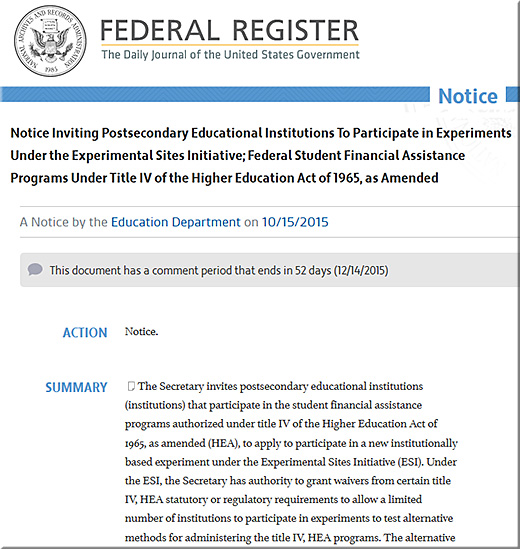Ed Dept pilot opens aid to alternative credentialing — from educationdive.com
Excerpt:
- The U.S. Department of Education on Wednesday [10/14/15] unveiled the Educational Quality Through Innovation Partnerships (EQUIP) program, an experimental pathway to Title IV funding for partnerships between higher ed institutions and nontraditional programs.
- The program has been brewing for some time under the experimental sites initiative, though it will remain limited to about 10 applications from applicable partnerships.
- Likely candidates for participation in the pilot include coding bootcamps, MOOC providers, and various short-term certificate and corporate training programs, and according to Inside Higher Ed, inclusion will also give institutions freedom from a federal aid ban on colleges that outsource over half of their content or instruction to an unaccredited third party.
Also see:
Excerpt:
Background: The landscape for learning in postsecondary education is undergoing tremendous development. Innovations in technology, pedagogy, and business models are driving rapid change. While much of this development has been led by traditional postsecondary institutions, there are also significant educational changes occurring outside of the traditional educational sector. Non-traditional providers have begun to offer educational opportunities to students in new ways, such as through intensive short-term programs, online or blended approaches, or personalized/adaptive learning. These opportunities have the potential to advance goals such as increased equity and access, more flexible and personalized learning, high-quality student outcomes, and reduced costs.
Although some of these educational opportunities show promise in advancing these priorities, they remain out of reach for many students, particularly those from low-income backgrounds, in part because they generally do not provide students with access to title IV aid. The unavailability of title IV aid could increase the potential for educational inequity, because only those students with significant financial resources are able to enroll in these innovative programs, and it may constrain the growth of promising new approaches to learning.









